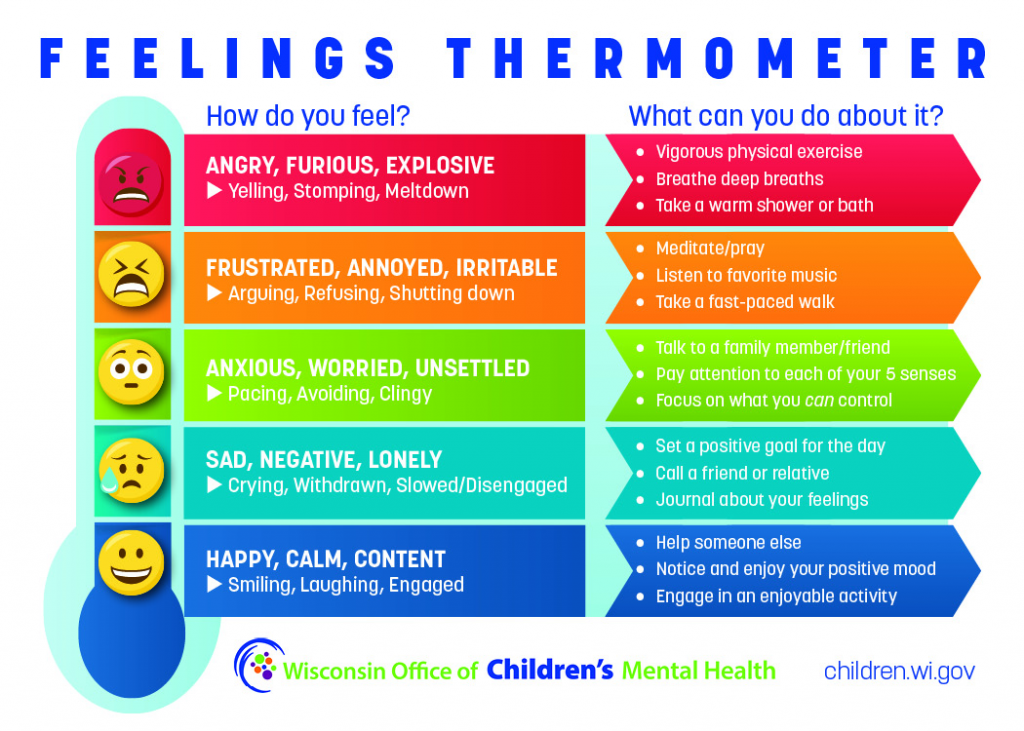And how to feel better
| By Erica Marriaga, MSW, LCSW

It is that time of year, AGAIN. The weather has been windy, cold, rainy, and there might be snow in the works. You might be having a difficult time awakening in the mornings and might be dreading the holiday hustle and bustle of running around.
It is important to remember that we might feel different emotions at different times and do not understand why.
Step 1. Learn the cause and effect of your emotions to help create a plan.
Describe the situation that is prompting strong emotions and behaviors. What are the facts of the situation, and what emotions are you experiencing?
For instance, say you send the kids to school (that is the fact of the situation). You might experience fear, anxiety, and nervousness (those are the emotions). You may ask yourself, “what if they come home without a mask, or even worse, wearing a friend’s mask? What if they are made fun of? How will I be able to help?”
If you take a look at the picture below, you will notice a feelings thermometer. This can help us to identify how we are feeling and what we can do about the emotion we are experiencing.

Step 2. List strategies to help empower your ability to change.
Once you’ve identified the facts and emotions in play, the next step is to decide what problem-solving or coping skills you want to use. Be specific and write out in detail how you will cope with the situation and emotions.
For example, “If my fear and anxiety increase, I might find myself overthinking and feeling guilty and my heart will feel like it is coming out of my chest.” Then counter with a coping strategy: “When this happens, I will try breathing in for 4 counts, holding for 7 counts, and breathing out for 8 counts. I might also stick my hands under cold water, because scientifically, there is evidence that this forces our body temperature to decrease, resulting in a decrease of emotions.”
Although I do not make the big bucks as a lawyer, I have found it helpful to be my own judge in these scenarios. I talk myself through the situation and my fears, and I might tell myself, “I have no evidence that the thoughts I am overthinking are true. I am grounded, and it will be okay.”
Having a plan can help you talk yourself through those powerful emotions in the moment which can help you react in the way you’d prefer rather than feeling out of control.
Understanding Anxiety and Depression Can Help You Understand Your Emotions
Symptoms of Depression
The most common symptoms of depression include fluctuations with sleep and appetite, no longer finding interest in pleasurable activities, isolation, hopelessness, fatigue, and physical symptoms.
Symptoms of Anxiety
The most common symptoms of anxiety can be broken down into emotional and physical symptoms. You might experience feelings of apprehension or dread, restlessness or irritability, while physically, you might notice racing heart, sweating, headache, upset stomach.
How Can I Feel Better When My Emotions Feel Out Of Control?

This can be as simple as you would like it to be. It is important to try to sit or lie down in a comfortable position. You can decide if you would like to keep your eyes open or closed. I usually focus on counting my breath in my head.
For example, 4-7-8 breathing. I count to 4 while breathing in through my nose. I hold my breath while I count to 7 in my head. Finally, I breathe out through my mouth, counting to 8. If you find that this is difficult, you can adjust the numbers in any way you want.
How would you rate your energy level after trying these out? You might also enjoy checking out these phone apps and websites:
- Positive affirmations, Music therapy
- Sleep meditation for kids
- Meditation for Kids
- Scientifically based mindfulness
Reach Out to a Counselor to Start Feeling Better
As always, if you find yourself struggling in these areas, do not hesitate to reach out for help. A licensed therapist or counselor can help empower you to be your best self! They can also teach helpful coping skills like those mentioned above to help you regulate out-of-control emotions and feel in control of your life.
Erica Marriaga is a proud mother of her son and two rescue dogs. She loves to spend time with her husband and bond with her family, nieces, and nephews. Erica is passionate and enthusiastic about her role as a therapist.
Check out Erica’s professional bio here!
EWC has locations in Manalapan and Shrewsbury, NJ, and accepts a variety of insurances.
Email Us: info@exceptionalwellnesscounseling.com
Call Now: (908) 415-2042
NEXT STEPS & RESOURCES
- Are you ready to take your first step? Reach out to us.
- Do you feel you may benefit from counseling during this time? Take the first step.
- Interested in online counseling? Learn more.
- Interested in group counseling? Learn More
- Resources

